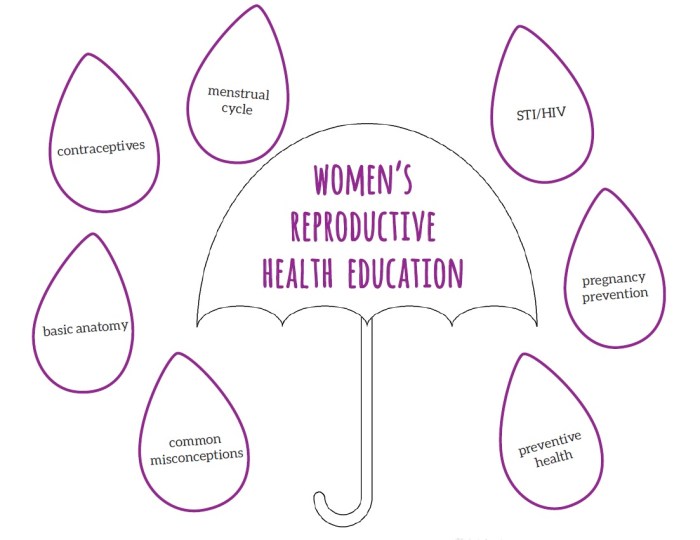
Embark on a journey through the realms of Reproductive health and family planning, where knowledge meets empowerment in a captivating blend of insights and practical tips. Get ready to explore the importance of these topics with a fresh perspective that will leave you informed and inspired.
Discover the significance of reproductive health education, the diverse range of contraceptive methods, the transformative impact of family planning, and the crucial role healthcare providers play in promoting overall well-being.
Reproductive Health and Family Planning
Reproductive health education is crucial as it empowers individuals to make informed decisions about their sexual and reproductive health. It includes information on contraception, sexually transmitted infections, pregnancy, and childbirth.
The Importance of Reproductive Health Education
Reproductive health education plays a significant role in promoting safe sexual practices, reducing the risk of unintended pregnancies, and preventing sexually transmitted infections. It empowers individuals to make informed choices about their bodies and relationships, leading to healthier outcomes.
- Provides knowledge on the importance of regular screenings and check-ups for sexual health.
- Teaches individuals about the different contraceptive methods available and how to use them effectively.
- Helps reduce stigma and misinformation surrounding reproductive health issues.
- Promotes gender equality and autonomy in decision-making related to sexual and reproductive choices.
Comparison of Contraceptive Methods
There are various methods of contraception available, each with its own advantages and considerations. It is essential to choose a method that aligns with an individual’s health needs, lifestyle, and preferences.
Some common contraceptive methods include condoms, birth control pills, intrauterine devices (IUDs), contraceptive injections, and sterilization.
- Barrier methods like condoms provide protection against sexually transmitted infections in addition to preventing pregnancy.
- Hormonal methods like birth control pills regulate menstrual cycles and reduce the risk of ovarian and endometrial cancers.
- Long-acting reversible contraceptives (LARCs) like IUDs are highly effective and require less frequent administration.
- Sterilization procedures offer permanent contraception for individuals who have completed their desired family size.
Positive Impacts of Family Planning
Family planning has numerous benefits for individuals, families, and societies as a whole. It allows for better health outcomes, economic stability, and improved quality of life.
- Reduces maternal and infant mortality rates by ensuring pregnancies are planned and spaced appropriately.
- Empowers women to pursue education, employment, and personal goals by giving them control over their reproductive choices.
- Helps alleviate poverty by enabling families to invest in their children’s education and healthcare.
- Promotes sustainable population growth and environmental conservation by controlling birth rates.
Role of Healthcare Providers in Promoting Reproductive Health
Healthcare providers play a crucial role in delivering comprehensive reproductive health services and information to individuals of all ages. They provide counseling, medical intervention, and support to ensure optimal sexual and reproductive health outcomes.
- Offering confidential and non-judgmental consultations for contraceptive counseling and family planning services.
- Performing screenings and tests for sexually transmitted infections and reproductive health conditions.
- Providing access to a wide range of contraceptive methods and assisting individuals in choosing the most suitable option.
- Promoting regular health check-ups and follow-ups to monitor the effectiveness of chosen contraceptive methods and overall reproductive health.
Spa and Wellness
When it comes to reproductive health, including services in spa and wellness programs can offer a range of benefits for individuals seeking to improve their overall well-being.
Benefits of Including Reproductive Health Services
- Access to expert advice and guidance on reproductive health issues
- Promotion of healthy lifestyle choices that support fertility
- Opportunities for stress reduction and relaxation, which are crucial for reproductive health
Relaxation Techniques at Spas
- Massage therapy can help improve blood circulation to reproductive organs
- Yoga and meditation can reduce stress levels and balance hormones
- Aromatherapy can promote emotional well-being and relaxation
Significance of Mental Well-being
- Mental well-being is closely linked to reproductive health outcomes
- Reducing stress and anxiety can improve fertility and menstrual regularity
- Counseling and therapy services can help individuals cope with reproductive health challenges
Spa Treatments for Reproductive Health Support
- Fertility massage techniques to improve reproductive organ function
- Acupuncture sessions to regulate menstrual cycles and enhance fertility
- Herbal treatments to support hormonal balance and overall reproductive health
Health Phobias

Phobias related to health can have a significant impact on reproductive health decisions, leading to anxiety, fear, and avoidance of necessary healthcare interventions. Overcoming these phobias is crucial for overall well-being and ensuring individuals receive the care they need.
Common Health Phobias and Their Impact
- Fear of doctors and medical procedures: This phobia can prevent individuals from seeking regular check-ups, screenings, and necessary treatments for reproductive health issues.
- Gynecophobia (fear of gynecological exams): Fear of gynecological exams can lead to delays in detecting reproductive health problems such as cervical cancer or sexually transmitted infections.
- Tokophobia (fear of childbirth): Tokophobia may impact family planning decisions and lead to avoidance of pregnancy due to fear of labor and delivery.
Strategies for Overcoming Health Phobias
- Seeking support from a therapist or counselor specialized in phobias can help individuals address and overcome their fears related to reproductive health.
- Gradual exposure therapy, where individuals gradually confront their fears in a controlled environment, can be effective in reducing anxiety and phobias.
- Education and understanding of reproductive health processes and procedures can help demystify the fear associated with medical interventions.
Real-Life Stories of Individuals Dealing with Health Phobias
- Case Study: Sarah was diagnosed with endometriosis but avoided seeking treatment for years due to her fear of medical procedures. After undergoing therapy and education, she was able to overcome her phobia and receive the necessary care.
- Case Study: John experienced tokophobia after witnessing a difficult childbirth. With the help of a support group and therapy, he was able to address his fear and make informed decisions about family planning.
The Importance of Addressing Health Phobias for Overall Well-Being
- Ignoring health phobias can lead to delayed diagnosis and treatment of reproductive health issues, impacting overall well-being and quality of life.
- By addressing and overcoming health phobias, individuals can take control of their reproductive health decisions and ensure they receive the necessary care and support.
Closing Notes

As we wrap up our exploration, remember that reproductive health and family planning are not just topics; they are pillars of a healthy and fulfilling life. Let this newfound knowledge empower you to make informed decisions and embrace a future filled with well-being and vitality.
FAQ Resource
What are the different methods of contraception?
Contraception methods vary from hormonal pills and patches to barrier methods like condoms and intrauterine devices (IUDs).
How does family planning positively impact societies?
Family planning leads to better economic stability, improved health outcomes, and reduced strain on resources, benefiting societies as a whole.
What is the role of healthcare providers in promoting reproductive health?
Healthcare providers offer guidance on reproductive health, promote preventive care, and ensure access to necessary services for individuals.
How can mental well-being affect reproductive health?
Mental well-being plays a significant role in reproductive health by influencing stress levels, decision-making, and overall quality of life.
Why is it important to address health phobias for overall well-being?
Addressing health phobias is crucial as they can impact reproductive health decisions, quality of life, and mental well-being, emphasizing the need for proper support and coping strategies.





